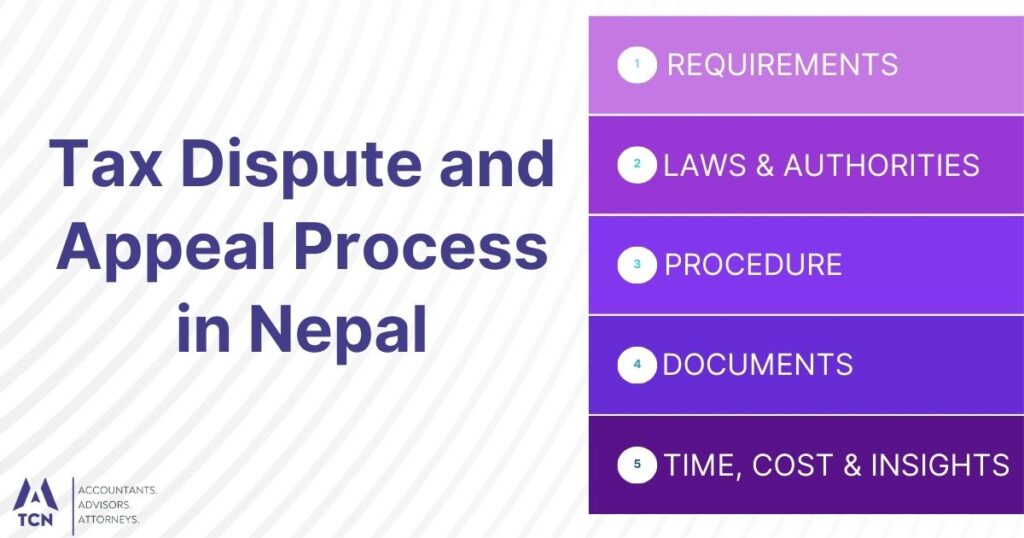As a leading tax consultancy firm in Nepal, Tax Consultants Nepal understands the complexities of navigating tax disputes and appeals. This comprehensive guide will walk you through the essential aspects of handling tax disagreements with the Nepalese authorities, ensuring you’re well-equipped to protect your interests and resolve conflicts efficiently.
What is a Tax Dispute in Nepal?
A tax dispute in Nepal occurs when a taxpayer disagrees with the tax assessment or decision made by the Inland Revenue Department (IRD). These disagreements can arise from various issues, including:
- Incorrect calculation of tax liability
- Disallowance of certain deductions or exemptions
- Misinterpretation of tax laws and regulations
- Disputes over the classification of income or expenses
Tax disputes often stem from differences in interpretation of tax laws or discrepancies in financial records. Understanding the nature of your dispute is crucial for determining the best course of action and resolving the issue effectively.
How to Initiate a Tax Dispute Resolution?
Initiating a tax dispute resolution in Nepal involves several key steps:
- Review the tax assessment notice carefully
- Gather all relevant documentation and evidence
- File a formal objection with the IRD within 30 days of receiving the assessment
- Clearly state the grounds for your objection
- Provide supporting documents and explanations
- Request a meeting with the tax officer if necessary
- Consider seeking professional assistance from a tax consultant
It’s crucial to act promptly and provide a well-documented case to support your position. The IRD will review your objection and may request additional information or clarification before making a decision.
What is the Process for Tax Appeals?
The tax appeal process in Nepal follows a structured path:
Administrative Review
- File an appeal with the IRD’s Review Committee within 30 days of the disputed decision
- Present your case and supporting evidence to the committee
- Await the committee’s decision, typically issued within 60 days
Revenue Tribunal
If dissatisfied with the Review Committee’s decision:
- File an appeal with the Revenue Tribunal within 35 days
- Attend hearings and present your case before the tribunal
- Provide additional evidence or expert testimony if required
- Receive the tribunal’s verdict, which is usually final for most cases
Supreme Court
In rare cases involving significant legal issues:
- File a petition with the Supreme Court within 35 days of the Revenue Tribunal’s decision
- Present legal arguments focusing on points of law
- Await the Supreme Court’s judgment, which is final and binding
Understanding each stage of the appeal process helps you prepare effectively and make informed decisions throughout the dispute resolution journey.
How Long Does a Tax Dispute Resolution Take?
The duration of a tax dispute resolution in Nepal can vary significantly depending on several factors:
- Complexity of the case
- Backlog of cases at the IRD or tribunals
- Cooperation between parties involved
- Availability of required documentation
- Need for additional investigations or expert opinions
On average, the timeline for resolution can range from:
- 3-6 months for simple disputes resolved at the administrative level
- 6-12 months for cases appealed to the Revenue Tribunal
- 1-2 years or more for complex cases reaching the Supreme Court
It’s important to note that these timeframes are approximate and can be influenced by various external factors. Maintaining open communication with tax authorities and providing prompt responses to inquiries can help expedite the process.
Relevant Articles:
- Documents for Filing Corporate Tax in Nepal
- Checklist for Annual Audit Preparation in Nepal
- VAT Process for Companies in Nepal
What Documents are Required for Tax Appeals?
Proper documentation is crucial for a successful tax appeal. Essential documents include:
- Original tax assessment notice
- Objection letter or appeal application
- Financial statements and tax returns for relevant years
- Supporting invoices, receipts, and contracts
- Correspondence with tax authorities
- Expert opinions or valuation reports (if applicable)
- Legal precedents or case laws supporting your position
Additional Documentation:
- Bank statements and transaction records
- Audit reports and management accounts
- Minutes of board meetings (for corporate taxpayers)
- Affidavits or sworn statements from relevant parties
Ensure all documents are well-organized, clearly labeled, and easily accessible. Providing comprehensive and accurate documentation strengthens your case and facilitates a smoother appeal process.
How to Prepare for a Tax Dispute Hearing?
Proper preparation is key to a successful tax dispute hearing. Follow these steps:
- Review all case documents thoroughly
- Organize your evidence in a logical manner
- Prepare a clear and concise presentation of your arguments
- Anticipate potential questions and prepare responses
- Practice your presentation with colleagues or a tax consultant
- Familiarize yourself with hearing procedures and etiquette
- Dress professionally and arrive early on the hearing day
Additional Tips:
- Stay calm and composed during the hearing
- Listen carefully to questions and respond thoughtfully
- Be honest and transparent in your responses
- Avoid confrontational or emotional language
- Bring extra copies of important documents
Remember, the goal is to present your case clearly and convincingly while maintaining a professional demeanor throughout the hearing process.
What are the Costs Involved in Tax Disputes?
Engaging in a tax dispute in Nepal can involve various costs:
- Legal fees for tax attorneys or consultants
- Filing fees for appeals and petitions
- Costs of gathering and preparing documentation
- Expert witness fees (if required)
- Travel expenses for hearings and meetings
- Potential interest and penalties on disputed amounts
Factors Affecting Costs:
- Complexity of the case
- Duration of the dispute
- Level of expertise required
- Need for specialized services (e.g., forensic accounting)
While costs can be significant, they should be weighed against the potential tax savings and long-term benefits of resolving the dispute favorably. Consider seeking a cost estimate from a tax professional before proceeding with an appeal.
How to Negotiate with Tax Authorities?
Effective negotiation with tax authorities can lead to favorable resolutions. Follow these strategies:
- Understand your position and the tax authority’s perspective
- Gather all relevant facts and supporting documentation
- Identify areas of potential compromise
- Prepare a clear and concise negotiation strategy
- Maintain a professional and respectful demeanor
- Be open to alternative solutions
- Know when to seek professional assistance
Key Negotiation Tips:
- Focus on facts rather than emotions
- Listen actively to the tax authority’s concerns
- Propose realistic solutions based on tax laws and regulations
- Be prepared to provide additional information promptly
- Consider the long-term implications of any agreement
Successful negotiation often requires a balance between assertiveness and flexibility. Building a cooperative relationship with tax authorities can lead to more efficient dispute resolutions.
What are the Possible Outcomes of Tax Disputes?
Tax disputes in Nepal can result in various outcomes:
- Full acceptance of taxpayer’s position
- Partial acceptance with compromise
- Upholding of original tax assessment
- Referral for further investigation
- Imposition of additional penalties or interest
- Negotiated settlement
- Dismissal of the case
Factors Influencing Outcomes:
- Strength of evidence presented
- Interpretation of tax laws and regulations
- Precedents set in similar cases
- Negotiation skills of involved parties
Understanding potential outcomes helps in setting realistic expectations and developing appropriate strategies for dispute resolution.
How to Choose a Tax Dispute Representative?
Selecting the right representative for your tax dispute is crucial. Consider these factors:
- Expertise in Nepalese tax law and regulations
- Experience handling similar tax disputes
- Track record of successful resolutions
- Communication skills and ability to explain complex issues
- Reputation and professional standing
- Fees and payment structure
- Availability and commitment to your case
Questions to Ask Potential Representatives:
- What is your experience with similar tax disputes?
- How do you approach negotiation with tax authorities?
- Can you provide references from past clients?
- What is your fee structure and estimated total cost?
- How will you keep me informed about the case progress?
Choosing a knowledgeable and experienced representative can significantly impact the outcome of your tax dispute, providing you with expert guidance throughout the process.
By understanding these key aspects of handling tax disputes and appeals in Nepal, you’ll be better prepared to navigate the complex world of tax disagreements. Remember, each case is unique, and seeking professional advice from experienced tax consultants can often lead to more favorable outcomes and peace of mind.
Get in Touch with Us
Our team consists of Chartered Accountants, Corporate Lawyers and Chartered Financial Analysts. Our Firm is renowned for provide expert legal, tax and financial services. Contact us for Quick Legal and Tax Consultation.
📧 Email: info@taxconsultantnepal.com
📞 Phone: +977 9709090127
📍 Location: Sinamangal Marga, Old Baneshwor, Kathmandu, Nepal
You can contact us via email, contact form, or phone call. We are also available on WhatsApp, Viber, Telegram, and WeChat for your convenience. Feel free to drop your queries, and our professionals will get back to you promptly.


